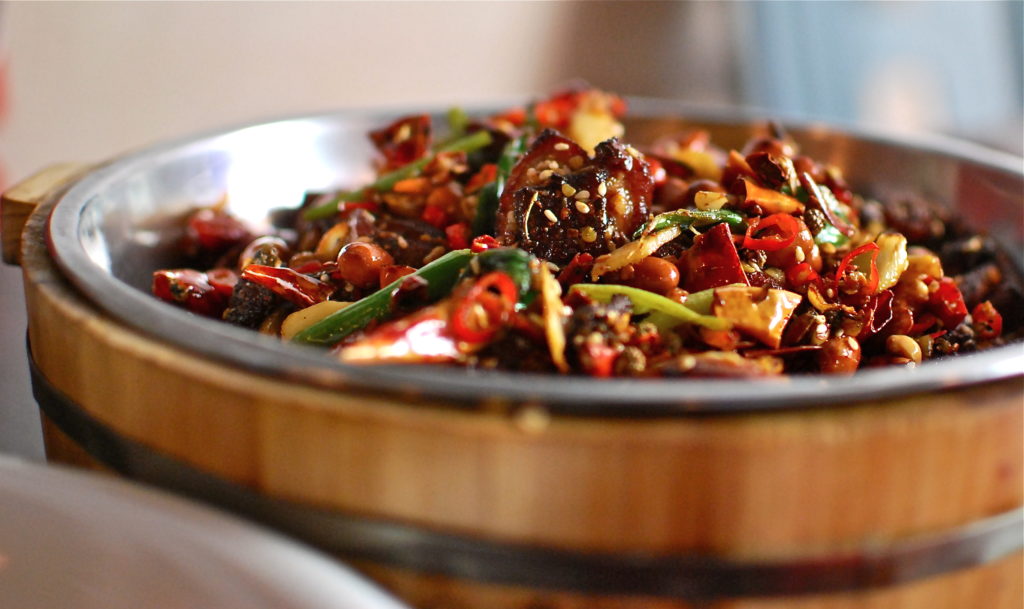Sichuanese,so Chinese!四川话
Let’s go to Sichuan this week and discover Sichuanese. Ain’t that so Chinese? 😉
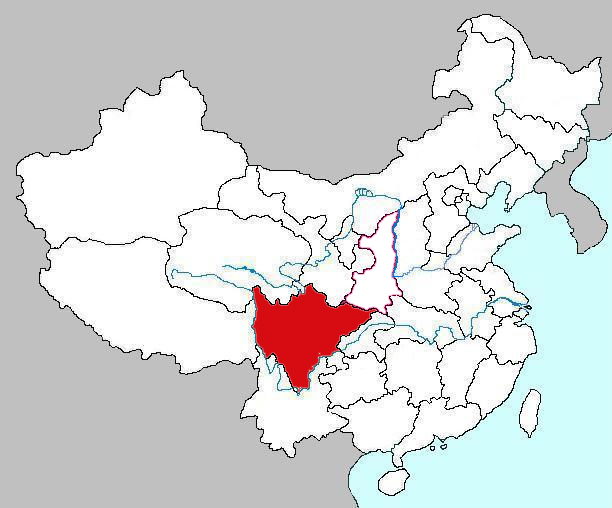
A little bit of history
Before we go any further, let me say a few words about the rich culture that has its roots in Sichuan. Located near Tibet and in the centre of China, Sichuan is quite big a region and its climate is rather damp. 四川 Sichuan is often thought of as to mean the “Four Rivers”, which are Jialing, Jinsha, Min and Tao. However, some claim otherwise.
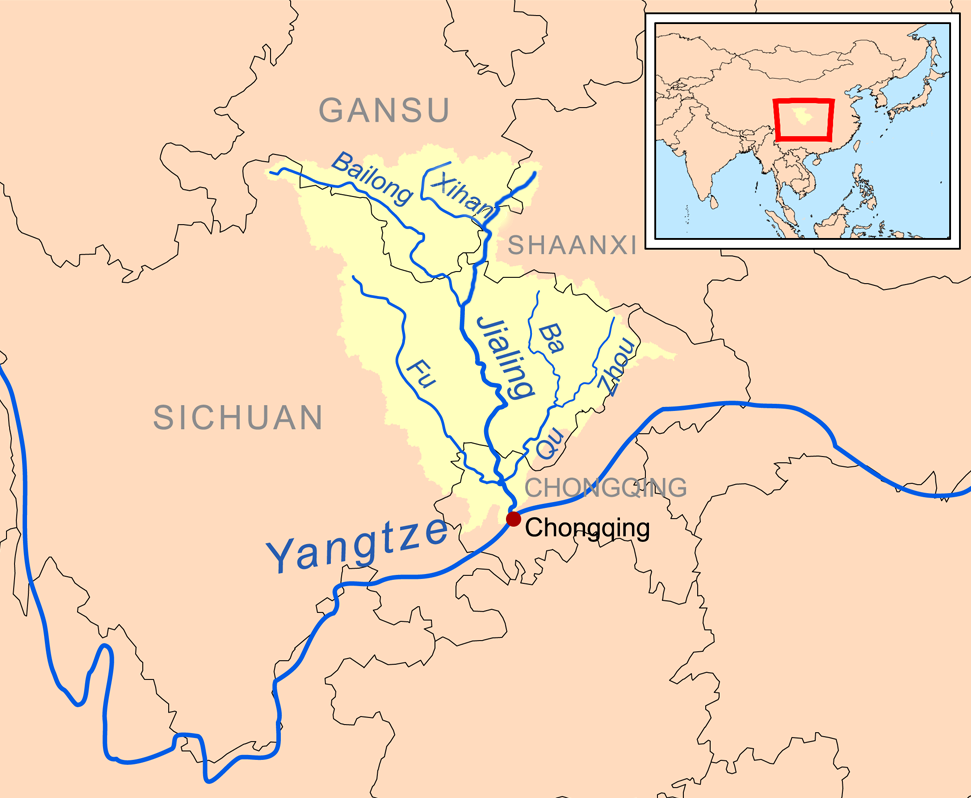
Indeed, some pretend that 四川 Sichuan would be an contraction of Sichuanlu 四川路, meaning the “Four Plain Circuit” and Chuānxiá Sìlù 川峡四路, “Four Circuits of Chuanxia”. 川 would mean “plain” here and not river and would refer to the division of existing administrative circuit area during the Northern Song dynasty…
Not being an historian, I have no idea which is the true meaning behind the word Sichuan, but at least you got the two main reasons often cited to explain such a name. As they say, when in doubt, take it all. Wait… They don’t say that, do they? 😉
In addition, Sichuan used to incorporate the region of Chongqing 重庆, but that is not the case anymore since 1997. As a matter of fact, historically speaking, it might be a bit more complicated than that, but we won’t go into details here. Should you be interested in know more about it, I urge you to do some research on Sichuan history because that’s quite fascinating.
To sum us, before it was known as the Sichuan 四川 we know, the people living there belonged to the Ba (巴) and Shu (蜀) kingdoms. As a result, the inhabitants of Sichuan were refered to as people from Ba-Shu. Both characters are used to describe Sichuan people, up to this day. Besides, rumor has it that the Shu family would come from the Yellow Emperor. That’s allegedly what is written in the Record of the Great historian, by Sima Qian 司马迁.
I like their emblem so I thought it’d be a good idea to share it with you. It is called the emblem of the Sun and the Immortal Bird.
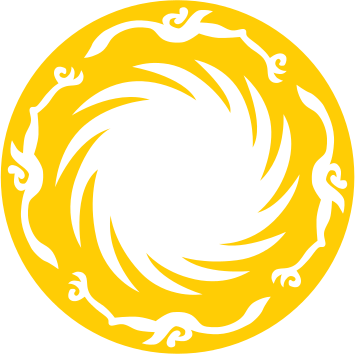
Sichuan is also famous for its Pandas!!! Yeah!!! That’s THE place on earth where they are raised! Moreover, the weather of Sichuan being quite damp, this may explain the need for the people living there to eat quite spicy… I uploaded below a typical Sichuan dish full of Sichuan spices. You may wanna try some if you ever visit the region.
Before we embark upon this linguistic journey into the banks of the Yangtze River – 长江 – and the land of the Pandas, let me introduce you to the Sichuanese way of speaking and the Sichuanese accent. Looks like our famous Panda star Po is in a good mood, isn’t he?
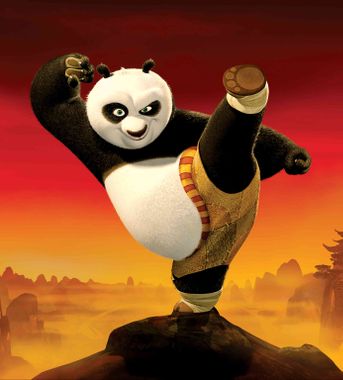
Sichuanese VS Mandarin
Compared with Mandarin Chinese, the placement of the tongue varies a great deal when speaking Sichuanese:
- “sh” become “s”, so 10 (shi) is pronounced like 4 (si)
- “ch” become “c”, che become cei. (see below)
- “zh” become “z”, zhao become zao.
- “h” is often pronounced “f”, like “hu” which is pronounced “fu“
- “e” in “ge”, “re”, “de” and “ke” become “ei”: 晓得 xiao dei, 没得 mei dei
- “ge”, “re”, “le” and “ke” sound like “go”, “ro”, “lo” and “ko”
- Words starting with a “n” often sound like a “ng” – a bit like Cantonese, I guess.
So, let’s be honest, it all sounds like a good old lisp. But it’s a typical one, probably inherited from the language of the 巴蜀 way of speaking! So, don’t make fun of it or Po will kick your arse!
Try to use those elements when speaking Sichuanese. For instance, for a simple like 你想吃什么, instead of saying ni xiang chi shen me, say ni xiang ci sa zi. (see why I use sa zi instead below).
It’s a bit difficult at first but I am sure that, overtime, you’ll get the hang of it. Basically, it’s just a matter of practice.
Useful words and sentences
| Sichuanese | Pinyin for Sichuanese | Mandarin equivalent with pinyin | English translation |
| 我说得来四川话 | wo suodeilai sìcuan hua | 我会说四川话 wǒ huì shuō sìchuān huà | I can speak Sichuanese |
| 撒子/啥子 | sa zi? | 什么 shénme | What? |
| 不存在 | bu cunzai | 不客气 bù kèqì | you’re welcome (after being thanked) |
| 乖 | ɡuai | 可爱 kě’ài | cute |
| 切 | qie | 去 qù | go |
| 晓得 | xiao dei | 知道 zhīdào | I know |
| 吃撒子 | ci sa zì | 吃什么 chī shénme | What are you eating? |
| 没得 | mei dei | 没有 méiyǒu | Don’t have |
| 没得事 | mei dei si | 没关系 méiguānxi | It doesn’t matter, no big deal |
| 哪个 | na go | 那个 nǎge | Which one/What? |
| 哪儿切 / 切哪儿嘛 | nar qie | 去哪儿? qù nǎ’er ? | Where to? (Taxis drivers will often ask this) |
| 来了哇 | lai le wa | 来了啊 láile a | Oh, you’re here (used as a greeting). |
| 瓜娃子 | gua wa zi | 笨蛋 bèndàn | Idiot |
| 耍 | sua | 玩儿 wánr | to have fun or to play |
| 甩了 | suaile | 干杯 gānbēi | Cheers, Bottoms up! |
| 中国 | zonggui | 中国 zhōngguó | China |
| 车 | cei | 车 chē | car |
| 巴适 | basi | 舒服 shūfu or 爽 shuǎng | Feels good!Great! comfortable, good or refreshing |
| 要得 | yaodei | 对 duì or 好 hǎo | good, right or okay |
| 要不得 | yaobudei | 不好 bù hǎo | not ok |
| 对的 | dui de | 好的 hǎo de | Right/aha/ok (used as a filler, but context and tone can change it’s meaning) |
| 嘎 / 要得不 / 不 | ɡa, yaodeibu, bu | 对不对 duì bùduì | right ? |
| 小妹儿 | xiaomer | 服务员 fúwùyuán | young waitress |
| 可以 | koyi | 可以 kěyǐ | can, able to, okay |
| 好钱 | haoqian | 多少钱 duōshǎoqián | How much is it? |
| 你是哪个国家的 | ngì si ngago guìjia dei | 你是什么国家的 nǐ shì shénme guójiā de | What is your home country? |
| 你说啥子 | ngi suo sazi | 你说什么 nǐ shuō shénme | What did you say? |
| 你在哪儿 | ngi zai ngar | 你在哪儿 nǐzàinǎr | Where are you? |
| 耙耳朵 | pa erduo | 妻管严 qī guǎn yán | Henpecked husbands, men who are afraid of their wifes (humorous expression) |
| 雄起 | xiongqi | 加油 jiāyóu | Good luck! All the best! |
| 在爪子 | zai zuazi | 在干什么?zài gànshénme? | What are u doing ? |
| 锤子 /毛线 | cuizi / maoxian | 放屁 fàngpì | nothing, nonsense, horseshit, fuck all |
| 咋个的了 | za go de liao | 怎么办 zěnme bàn | what to do |
| 龟儿子 | gui erzi | 王八蛋 wángbā dàn | son of a bitch |
| 歪 | wai | 假 jiǎ | fake |
| 娘娘 | niangniang | 阿姨 āyí | aunt, nanny, miss, Madam |
Finally, to make you hear the difference between Mandarin/Putonghua 普通话 and Sichuanese 四川话, allow me to upload a bit of rap music. I like the instruments and in it. You may see some folks from the Sichuan Opera, which I haven’t mentioned yet but it’s quite famous as well, culturally speaking.
The song is about how happy they are about their new clothes… Well, why not? After all, it feels good to look good… At first, you might hear mandarin Chinese sang by the Chinese famous artist VAVA but later, when Ty, a Sichuan rap artist, starts rapping, you’ll notice a sort of lisp in his speech. That’s no lisp but that’s Sichuanese! 巴适!
Try to get familiar with it if you can because it can be rather useful when conversing with Chinese people. It will enable you to understand new accents. Besides, words like 晓得 are excellent and can also be added to your mandarin vocabulary.
Chinese Slang, 牛逼!
This week, on my blog, I wanted to tell you guys a bit more about Chinese slang.
Chinese New Year is almost over – well, not yet, because the Lantern Festival has not yet taken place, but let’s just assume that is the case – and it’s time for us to focus on streetwise Chinese.
This is a very large topic, and, obvously, I won’t be able to cover it all here. It is too broad a topic for it to be covered exhaustively. That’s a very interesting one though.
I have decided to solely lay emphasis on some general slang terms used all over the place in China and on some terms used to circumvent the censorship taking place in China.

This post may be used as a guide for those of you who would like to further deepen their understanding of Chinese slang. It’s just a start in your journey into Chinese slang and a lot more awaits you…
Anyway, that being said, let’s get down to the nitty gritty and have a look of some commonplace, classic slang terms you are bound to encounter when going to China. The following terms have been vetted by my personal experience, so I know most of them are used quite often. Thus, I can vouch for their daily use.
Chinese slang
| 牛(屄/逼) | niú (bī) | awesome, cool. Lit the cow’s private parts… |
| 酷 | kù | cool (好酷喔 hǎo kù ō; that’s cool!); lit., equiv. cool |
| 太棒了 | tài bàngle | awesome! Swell! |
| 放屁 | fàngpì | to speak nonsense; lit. ‘to fart’ |
| 哥们(儿) | gēmen (er) | mate (friend), buddy, bro |
| 老铁 | lǎo tiě | mate (friend), buddy, bro |
| 废话 | fèihuà | to speak nonsense, to trashtalk; lit. ‘to waste words’ |
| 吹牛 | chuīniú | to brag, boast |
| 摸鱼 | mō yú | to be lazy on the job; lit. to rub fish |
| 赞 | zàn | likes, or to “like” (facebook like) |
| 王八蛋 | wángbā dàn | son of a bitch; lit. turtle egg |
| 坏蛋 | huàidàn | crook, scoundrel; lit. rotten egg |
| 笨蛋 | bèndàn | idiot; lit. stupid egg |
| 二百五 | èrbǎiwǔ | 250. In China, if you’re 250, you’re stupid. |
| 傻逼 | shǎbī | jerk, asshole, motherfucker |
| 弯的 | wān de | a bender, gay, queer |
| 杀价 | shājià | to haggle, to bargain |
| 同志 | tóngzhì | gay or lesbian (normally “comrade” in a Communist context) |
| 狐狸精 | húlíjīng | a woman that steals another woman’s man; lit. a fox spirit |
| 一夜情 | yīyèqíng | a one-night stand; lit. love for one night |
| 分手 | fēnshǒu | to break up in a relationship; to bid farewell; lit. divide hands |
| No 做 no死 / die | No zuò no sǐ/ die | Don’t look for trouble or you’ll be in trouble |
| 么么哒 | me me dá | mwak!, kiss, xxx |
| 自拍 | zìpāi | take selfies |
| 葛优躺 | géyōu tǎng | couch potato |
| 闺蜜 | guīmì | BFF (only for girls) |
| 累死了 | lèi sǐle | knackered, exhausted, worn out |
| 开玩笑, 胡说八道 | kāiwánxiào, húshuō bādào | to banter, to kid, to joke |
| 花瓶 | huāpíng | an airhead, a bimbo. Hot but very stupid. Lit. An empty vase |
| 丑八怪 | chǒubāguài | minger (UK), dog, pig, ugly woman, plain Jade, old boiler, old boot |
| 佛系 | fú xì | zen, detached, let nature takes its course |
| 种草莓 | zhǒng cǎoméi | to kiss someone passionately, leaving a reddish mark (equiv. to give someone a hickey); lit. to plant strawberries |
| 白痴 | báichī | idiot; stupidity; lit. white fool |
| 蠢货 | chǔnhuò | idiot, blockhead, dunce, moron (used infrequently) |
| 傻瓜 | shǎguā | fool, simpleton (sometimes used lovingly); lit. stupid melon |
| 小子 | xiǎozi | guy, kid; prick, brat |
| 疯子 | fēngzi | madman, lunatic |
| 发疯 | fāfēng | to become insane, to go mad |
| 娘娘腔 | niángniáng qiāng | sissy, girly, effeminate (esp. of a male) |
| 傢伙 | jiāhuo | guy, chap (negative); weapon, gun |
| 吹牛 | chuīniú | to brag, boast |
| 摸鱼 | mō yú | to be lazy on the job; lit. to rub fish |
| 干嘛 | gàn ma | exclamation, “What is it now?” or “What do you want now?” “Why”, indicating irritation; why (impolite) |
| 炒饭 | chǎofàn | to make love; lit. to fry rice |
| 闭嘴 | bì zuǐ | Shut up ! |
| 不造 | bù zào | dunno (不知道 in a shortened form) |
| 約炮 | yuē pào | booty call, casual sex |
| 杀马特 | shā mǎ tè | Chinese subculture of young urban migrants, usually of low education, with exaggerated hairstyles, heavy make-up, flamboyant costumes, piercings etc (loanword from “smart”) |
| 直男 | zhí nán | straight |
| 宅男 | zháinán | otaku (male) |
| 宅女 | zhái nǚ | otaku (female) |
| 拍马屁 | pāimǎpì | to suck up to sb, lick boots. Lit pat on a horse’s butt |
| 马屁精 | mǎpìjīng | bootlicker, a brown-noser. |
| 条子 | tiáozi | a police officer; a strip (esp. of paper), a note |
| 老外 | lǎowài | foreigner (neutral connotation) |
| 我肏 !(他)妈的 | wǒ cào!(Tā) mā de | Fuck!, Shit!, To hell with it!, Damn it!; used to increase vulgarity. 他妈的 can also meaning “fucking…” |
| 扎心了 | zhā xīnle | you broke my heart (used for irony or hyperbole) |
| 油腻 (男) | yóunì (nán) | flat slob, repulsive middle-age man, lit. Oily |
I couldn’t help but show you a picture of what 杀马特 – shā mǎ tè – is all about. It’s quite famous in China and made me laugh quite a bit the first I heard about this phenomenon.
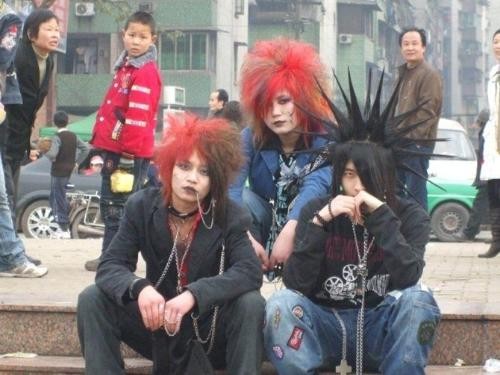
China being a communist country, some words might be removed from the Chinese keyboard – such as “Wo cao”, whose proper spelling is “我肏”, but which is almost always replaced by 卧槽 due to its similar pronounciation – but, worry no more my friends, because a lot of ways are found to circumvent censorship.
Slang to avoid censorship
I have seen most of these words in use but not all of them. What is more, be cautious when you use them. Some people might not know them or be aware of their double meanings.
| 河蟹 | héxiè | censorship, harmony (= 和谐)=> river crab |
| 目田 | zitian | freedom (=自由)=> my field |
| 躲貓貓 | duǒmāomāo | hide and seek (Chinese police brutality in prisons) |
| 抄水表 | chāoshuǐbiǎo | Police pays a visit to your place (to check a water meter) |
| 帝都 | dìdū | imperial city (making fun of Beijing all too powerful) |
| 打酱油 | dǎ jiànɡyóu | just passing by (getting soy sauce) |
| 草泥马 | cǎo ní mǎ | Grass Mud Horse… actually means “Fuck your mother” |
| 法克鱿 | fǎ kè yóu | French-Croatian Squid… this one is rather explicit. |
| 雅蠛蝶 | yǎ miè dié | Small Elegant Butterfly (Yamete: stop it! from Japanese porn) |
| 菊花蚕 | jú huā cán | Chrysanthemums scattered… Chrysanthemums means “asshole” in Chinese. So I let you imagine |
| 鹑鸽 | chún gē | Quail pigeon ( 春哥= effeminate person) |
| 吉跋猫 | jí bá māo | Lucky Journey Cat (鸡巴毛 = hairy penis) |
| 尾申鲸 | wěi shēn jīng | Stretch-Tailed Whale ( 卫生巾= menstruation pads ) |
| 达菲鸡 | dá fēi jī | Intelligent Fragrant Chicken ( 打飞机 = masturbate) |
| 喝茶 | he cha | Police investigation (= 核查) |
| 传世 | chuanshi | reincarnate (been deleted and created again) |
| 自干五 | zi gan wu | 50 cents volunteers that use propaganda techniques in favour of the Chinese government |
| 科学上网 | kexue shangwang | circumvent China’s internet censorship |
| 宅左 | zhaizuo | Chinese Extremist (leftist from the party) |

Well, that’s all for our Chinese slang today.
Feel free to let me know if you want me to add some terms in those columns!
I haven’t added Chinese acronyms (used with numbers) yet and will probably do so in the future. Nonetheless, I’ll conclude this post by using 2 examples to illustrate how some might be used: one of the last Chinese slangy term of this page is “88” (baba). It’s often used to say “bye bye” in Chinese because it’s very similar to its Chinese equivalent, just like “thank you” for “3Q” (san Q).
So, 88! 3Q 4 reading that post!
😉
红楼梦 – Dream of the Red Mansion
In the run-up to the Chinese New Year celebrations, I managed to get hold of those great poems from 红楼梦 – Dream of the Red Mansion in English.
I wanted to share them with you because I think they rank among the best poems ever and they do not get the praise they deserve.
Let me know if you like them as much as I do! 😉
红楼梦引子
开辟鸿蒙,谁为情种?
都只为风月情浓。
趁着这奈何天,伤怀日,寂寥时,试遣愚衷。
因此上,演出这怀金悼玉的《红楼梦》。
FIRST SONG: Prologue To The Dream of the Red Mansion
At the dawn of creation
Who sowed the seeds of love?
From the strong passion of breeze and moonlight they came.
So in this world of sweet longingOn a day of distress, in an hour of loneliness,
Fain would I impact my senseless grief
By singing this Dream of Red Mansions
To mourn the Gold and the Jade.
终身误
都道是金玉良姻,俺只念木石前盟。
空对着,山中高士晶莹雪,终不忘,世外仙姝寂寞林。
叹人间,美中不足今方信。
纵然是齐眉举案,到底意难平。
SECOND SONG: A Life Misspent
Well-matched, all say, the gold and the jade;
I alone recall the pledge between plant and stone.
Vainly facing the hermit in sparking snow-clad hills
I forgot not the fairy in lone woods beyond the world.
I sigh, learning that no man’s happiness in complete;
Even a pair thought well-matchedMay find disappointment.
枉凝眉
一个是阆苑仙葩,一个是美玉无瑕。
若说没奇缘,今生偏又遇着他,
若说有奇缘,如何心事终虚化?
一个枉自嗟呀,一个空劳牵挂。
一个是水中月,一个是镜中花。
想眼中能有多少泪珠儿,
怎经得秋流到冬,春流到夏!
THIRD SONG: Vain Longing
One is an immortal flower of fairyland, the other fair flawless jade.
And were it not predestined, why should they meet again in this existence?
Yet, if predestined, why does their love come to nothing?
One signs to no purpose, the other yearns in vain.
One is the moon reflected in the water, the other but a flower in the mirror.
How many tears can well from autumn till winter, from spring till summer?
恨无常
喜荣华正好,恨无常又到。
眼睁睁,把万事全抛。
荡悠悠,把芳魂消
耗。望家乡,路远山高。
故向爹娘梦里相寻告:
儿命已入黄泉,天伦呵,
须要退步抽身早!
FOURTH SONG: The Transience of Life
At the height of honour and splendour, Death comes for her;
Opened-eyed, she has to leave everything behind
As her gentle soul passes away.
So far her home beyond the distant mountains
That in a dream she finds and tells her parents;
“Your child has gone now to the Yellow Spring;
you must find a retreat before it is too late.”
分骨肉
一帆风雨路三千,把骨肉家园齐来抛闪。
恐哭损残年,告爹娘,休把儿悬念:
自古穷通皆有定,离合岂无缘?
从今分两地,各自保平安。
奴去也,莫牵连。
FIFTH SONG: Separation From Dear Ones
Three thousand Li she must sail through wind and rain,
Giving up her home and her own flesh and blood;
But afraid of distress their declining years with tears
She tells her parents : “Don’t grieve for your child.
From of old good luck and bad have been predestined,
Parting and reunions are decreed by fate;
Although from now on we shall dwell far apart,
Let us still live at peace;
Don’t worry over your unworthy daughter.”
乐中悲
襁褓中,父母叹双亡。
纵居那绮罗丛,谁知娇养?
幸生来,英豪阔大宽宏量,
从未将儿女私情略萦心上。
好一似,霁月光风耀玉堂。
厮配得才貌仙郎,博得个地久天长,
准折得幼年时坎坷形状。
终久是云散高唐,水涸湘江:
这是尘寰中消长数应当,何必枉悲伤!
SIXTH SONG: Sorrow Amidst Joy
She is still in her cradle when her parents die,
Although living in luxury who will dote on her?
Happily she is born too courageous and open-hearted
Ever to take a love affair to heart.
Like bright moon and fresh breeze in a hall of jade
She is matched with a talented and handsome husband;
May she live with him for long years
To make up for her wretched childhood!
But over the kaotang Tower the clouds disperse,
The river Hsiang runs dry.
This is the common fate of mortal men
Useless it is repine.
世难容
气质美如兰,才华阜比仙。天生成孤癖人皆罕。
你道是啖肉食腥膻,视绮罗俗厌,却不知太高人愈妒,过洁世同嫌。
可叹这,青灯古殿人将老,辜负了,红粉朱楼春色阑。
到头来,依旧是风尘肮脏违心愿。
好一似,无瑕白玉遭泥陷,又何须,王孙公子叹无缘。
SEVENTH SONG: Spurned By The World
By nature fair as an orchid
With talents to match an immortal,
Yet so eccentric that all marvel at her.
To her, rich food stinks.
Silken raiment is vulgar and loathsome;
She knows not that superiority fosters hatred,
Her powder and red chamber, her youth and beauty wasted,
To end, despite herself, defiled on the dusty road,
Even as lawless white jade dropped in the mud.
In vain young scions of noble houses will sigh for her.
喜冤家
中山狼,无情兽,全不念当日根由。
一味的骄奢淫荡贪欢媾。
觑着那,侯门艳质同蒲柳,作践的,公府千金似下流。
叹芳魂艳魄,一载荡悠悠。
EIGHTH SONG: Union of Enemies
A mountain wolf, a savage ruthless beast,
Mindless of past obligationsGives himself up to pride, luxury and license,
Holding cheap the charms of a noble family’s daughter,
Trampling on the precious child of a ducal mansion.
Alas, in less than a year her sweet soul fades away.
虚花悟
将那三春看破,桃红柳绿待如何?
把这韶华打灭,觅那清淡天和。
说什么,天上夭桃盛,云中杏蕊多。
到头来,谁把秋捱过?
则看那,白杨村里人呜咽,青枫林下鬼吟哦。
更兼着,连天衰草遮坟墓。
这的是,昨贫今富人劳碌,春荣秋谢花折磨。
似这般,生关死劫谁能躲?
闻说道,西方宝树唤婆娑,上结着长生果。
NINTH SONG: Perception of The Transience of Flowers
She will see through the three Spring and set no store
By the red of peach-blossom, the green of willows,
To savour the limpid peace of a clear sky.
Though the peach runs riot against the sky.
Though the clouds teem with apricot blossom.
Who has seen any flower that can win safely through autumn?
Even now mourners are lamenting by groves of poplars,
Ghosts are wiling below green maples,
And the weeds above their graves stretch to the skyline.
Truly, changes in fortune are the cause of men’s toil,
Spring blooming and autumn withering the fate of flowers.
Who can escape the gate of birth, the fate of death?
Yet in the west, they say grows the sal tree
Which bears the fruit of immortality.
A pun meaning the three months of spring and the three elder Chia
girls. All the Chia girls had the character spring in their names.
It was said that Sakyamuni (Buddha) attained Buddhahood in a grove of sal trees.
聪明累
机关算尽太聪明,反算了卿卿性命。
生前心已碎,死后性空灵。
家富人宁,终个有,家亡人散各奔腾。
枉费了,意悬悬半世心;
好一似,荡悠悠三更梦。
忽喇喇似大厦倾,昏惨惨似灯将尽。
呀!一场欢喜忽悲辛。
叹人世,终难定!
THENTH SONG: Ruined By Cunning
Too much cunning in plotting and scheming
Is the cause of her own undoing;
While yet living her heart is broken
And after death all her subtlety comes to nothing.
A rich house, all its members at peace,
Is ruined at last and scattered;
In vain her anxious thought for half a lifetime,
For like a disturbing dream at dead of night,
Like the thunderous collapse of a great mansion,
Or the flickering of a lamp that gutters out,
Mirth is suddenly changed to sorrow.
Ah, nothing is certain in the world of men.
留余庆
留余庆,留余庆,忽遇恩人,幸娘亲,幸娘亲,积得阴功。
劝人生,济困扶穷,休似俺那爱银钱忘骨肉的狠舅奸兄!
正是乘除加减,上有苍穹。
ELEVENTH SONG: A Little Act of Kindness
Thanks to one small act of kindness
She meets by chance a grateful friend;
Fortunate that her mother
Has done some unnoticed good.
Men should rescue the distressed and aid the poor,
Be not like her heartless uncle or treacherous cousin
Who for love of money forget their own flesh and blood.
Truly, rewards and punishments are meted out by Heaven.
晚韶华
镜里恩情,更那堪梦里功名!
那美韶华去之何迅!再休提锈帐鸳衾。
只这带珠冠,披凤袄,也抵不了无常性命。
虽说是,人生莫受老来贫,也须要阴骘
积儿孙。气昂昂,头戴簪缨,光灿灿,胸悬金印;
威赫赫爵,禄高登,昏惨惨,黄泉路近!
问古来将相可还存?也只是虚名儿与后人钦敬。
TWELFTH SONG: Splendour Comes Too Late
Love is only a reflection in a mirror,
Worse still, rank and fame are nothing but a dream,
So quickly youth and beauty fade away.
Say no more of embroidered curtain and love-bird quilts,
Nor can a pearl tiara and phoenix jacket
Stave off for long Death’s summons.
Though it is said that old age should be free from want,
This depends on the unknown merits laid by for one’s children.
Jubilant in official headdress
And glittering with a gold seal of high office,
A man may be awe-inspiring and exalted,
But the gloomy way to the Yellow Spring is near.
What remains of the generals and statesmen of old?
Nothing but an empty name admired by posterity.
好事终
画梁春尽落香尘。
擅风情,秉月貌,便是败家的根本。
箕裘颓堕皆从敬,家事消亡首罪宁。
宿孽总因情!
THIRTEENTH SONG: Good Thing Come To An End
Fragrant dust falls from painted beams at the close of spring;
By nature passionate and fair as the moon,
Her true root is of the family’s destruction.
The decline of the old tradition starts with Jing,
The chief blame for the house’s ruin rests with Ning,
All their sins come about through Love.
飞鸟各投林
为官的,家业雕零;
富贵的,金银散尽;
有恩的,死里逃生;
无情的,分明报应。
欠命的,命己还;
欠泪的,泪已尽。
冤冤相报自非轻,
分离聚合皆前定。
欲知命短问前生,
老来富贵也真侥幸。
看破的,遁入空门;
痴迷的,枉送了性命。
好一似食尽鸟投林,
落了片白茫茫大地真干净!
EPILOGUE: The Birds Scatter To The Wood
An official household declines,
Rich nobles’ wealth is spent.
She who did good escapes the jaws of death,
The heartless meet with certain retribution.
Those who took a life have paid with their own lives,
The tears one owed have all been requited in kind,
Not light the retribution for sins against others;
All are predestined, parting and reunions.
Seek the cause of untimely death in a past existence,
Lucky she who enjoys rank and riches in old age;
Those who see through the world escape from the world.
While foolish lovers forfeit their lives for nothing.
When the food is gone the birds return to the wood;
All that’s left is emptiness and a great void.
A small note about 红楼梦 – Dream of the Red Mansion
That’s it for now! I hope you enjoyed those poems from 红楼梦 – Dream of the Red Mansion. The Dream of the Red Mansion is ranked among the 4 classics of Chinese literature and I urge you to read it, should you be interested in discovering more about Chinese culture.
Southern French Slang
To any foreigner having to drop by Southern France, you may have been staggered by French slang.
That makes sense. We definitely speak French but also have our own jargon. This may be due to a long trail of history and linguistic blend. However, strictly speaking, before France became the nation it is today, it was made up of several kingdoms in the Middle Ages, among which three main linguistic families emerged:
- Occitan or Langue d’Oc
- Langues d’Oïl
- Franco-provençal
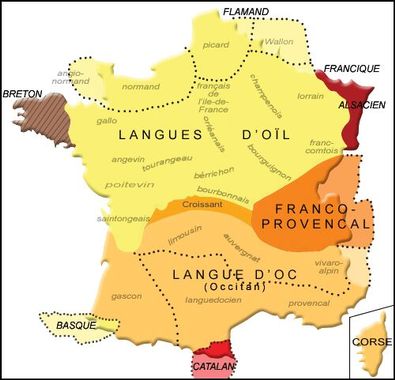
As you might see in the map, other languages were spoken as well such as Corsican, Breton, Catalan, Basque, Alsacien and so on. As a result, the linguistic variety of vernacular expressions in France is quite rich.
Personally, I think any regional language matters. I have no time to deal with all of them here, but might do so in the future. So, if you’re Breton, Basque or from any other French place, please keep in mind I didn’t forget or dismiss you by mentioning only those 3 main languages and may post about your language soon enough.

We won’t focus on langue d’Oïl or Franco-provençal today but that may be the topics of another post, should we be learning bits of Chtimi – which is quite enjoyable but I need to do some research on that because I am no specialist. ^^
As a southerner, I am proud of coming from such a nice place and that is the reason why I would like people to know more about our culture and slang. As I mentioned in my previous posts, slang is an integral part of a culture.
I am thus going to put the emphasis on some typical Southern slang or expressions.
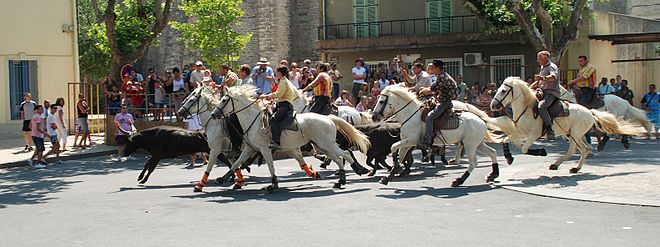
Slang from Southern France
The following expressions are mainly from Southern France. Some may not be considered as slang but remain rather typical:
- Pitchoun: kids, another way of describing those little creatures who run around all day. (Pronounce the final “n”)
- Peuchère: you poor thing. Often used ironically.
- Brave: a sucker… Being nice is all right but being too nice means you’re weak and that is being “brave”.
- Gavé de monde, clafi de monde : full of people, crowded, packed.
- Degun: nobody. This one is a must-know if you ever go to Marseilles or Provence. (Pronunce it “Dég 1”)
- Fada, avoir le vire-vire dans la tête, un fondu, un jobastre, un calu: crazy, nuts, a nutter. (“Il roule comme un calu cet abruti !”)
- T’inquiète! (je gère): t’inquiète pas => don’t worry (I can handle my shit). A short way of writing this while texting is “tkt”.
- Le cagnard: the sun, especially when it’s scorching hot.
- Une cagole: a bimbo, an airhead. Yeah, we got some too. (pronounce “gu” not like “j” before the “o”)
- Vé!: Expression quite similar to “Watch this! Lo (and behold)!”
- Tè!: Almost the same as Vé! but Vé is more focused on “look!”. Tè is closer to “Tiens!” (Here, here you go).
- Oh con !, Fatch de! , Ôh Fan!, Fan dé/(Hil)dé pute ! (watch out when you say the last one because some other French people might understand it the wrong way if they’re not familiar with Southern French) and lastly, the famous “Fan de Chichourle/Chichoune!”. The latter is really funny and nice to use. Indeed, people may smile whenever you use it. They all mean D*** ! , F*** ! to express your amazement or discontent.
- Pastaga: Pastis. A typical beverage that’s quite famous near Marseilles.
- Feria: it’s a cultural thing. It doesn’t always have to include bulls in it. It’s a good old way to go out, drink happily (too much?) and meet friends. We can have “abrivados” (running with the bulls being surrounded by horses and gardians) or “encierros” (closing a village and teasing the bulls. This one is more violent). Feel free to check those terms on the internet.
- Une piche: a good for nothing, a loser, a moron.
- Un pébron: an idiot (in Provençal, this also means pepper)
- Ça m’espante: it amazes me. Espanté means you were quite surprised, not to say gobsmacked. Often used as a hyperbole though… “Comme i(l) gère au ballon (football), ça m’a espanté.”
- Emboucaner: to stink, reek.
- Ensuqué: tired, sleepy. Usually because it’s very hot. Can be used to describe a halfwit. (“Vé le lui ! Il a l’air tout ensuqué.”)
- Chaler: in Provence, this means letting a friend sit on the handlebars while you pedal (very convenient when you’re a kid and you wanna go far with your friends but lack any susbtantial means of transport… ^^). I happened to notice that not many French people got my drift when I said that… So at least, you’ll be familiar with this term. (“Viens, on va à la galerie marchande cette aprèm, tu me chales?”)
- Clampin, dormiasse, mouligasse, feignasse: lazybones.
- Ça/tu m’escagasse(s) !: this is/you’re a pain in the a*** !. Typically from Provence when someone/something annoys you. Can also say “tu/ça me fait caguer”.
- Empéguer: empégué can mean “drunk”, “hit” (by) something or “fined” by a cop. (“Quel pébron! I(l) s’est empégué le mur après avoir quillé le ballon.”)
- Adéssias: bye in provençal
- Quésaco ?, Qu’es aquo ?: C’est quoi ? => What is that ?
- (S’)Escamper: leave. (“Bon, il se fait tard. Aller zou, je m’escampe”)
- Empapaouter: to con, to dupe.
- Ça pègue: it’s sticky. Usually to describe the floor when beers has been spilled on it, quite mucky and sticky indeed.
- Cané: knackered, worn out, exhausted.
- Une bugne: French equivalent of “coup”, hence a blow. (“Vé ! La bagnole, elle a pris une bugne ici…”)
- Oh garri ! (to a man), Oh nine ! (to a woman): Hey young man / lady !
- (Es)Quiché : packed in a bus or metro or anywhere else. (“C’est petit ici, vé comme on est quiché!”)
- Décaniller: its French equivalent would be “dégommer”. So, it might mean “take out”, “pick off”, “unstick”, “unseat”… (“Au jeu de société Risk, je t’ai décanillé tous tes pions”)
- Rouméguer: to grumble, moan. In the north, they use “râler”.
- Avise!, Meff(i)!: from my perspective, “avise”(from aviser) is typically from Nîmes and I use it a lot. It can be heard in Ferias when the bull is running towards you and a friend warns (French equivalent of aviser) you for you to move. “Meff” or “meffi” is used around Marseilles to say “be careful” – it is short for “méfie-toi”.
Additional vocabulary
Finally, a few expressions which are more from the region of Toulouse, Bearn and the Basque country (not necessarily slang though):
- Chocolatine. I couldn’t avoid that one. In other places, they say “Pain au chocolat”. We say chocolatine. Full stop.
- Adiou, Adishatz : Hello or Goodbye. Depends on when you say it (both words can be used anytime). Usually, from my perspective, “Adiou” is more used to say hi and adishatz bye, but it depends on how you use them.
- Arsouille: an alcoholic. Used to take the piss out of a mate.
Finally, this last expression is probably not from the south but I like it so I hope more people become aware of it: “Ouais et ma grand-mère, elle a un grille pain.” If you’re not familiar with this expression you may wonder why I say that because it makes no sense whatsoever. The truth is by saying that I imply that what you say is absolutely ininteresting and dull, so much so that I can’t be bothered listening to it anymore. It’s a nice subtle way of saying “Yeah yeah whetever.”
Please note that a lot of people use all those expressions, they be from South-East or South-West France, whereas some don’t. It all depends.
But one thing is for sure, you may hear a lot of similarities between Southerners. For instance, if you’re located in the South, you might be likely to hear the “s” at the end of “moins” pronounced a lot more than, say, in Paris. Likewise, “une brêle” (a good for nothing, a loser) will probably have negative connotations anywhere in the South (and elsewhere) as well…
Feel free to let me know if you think other great expressions should be added to that list. I will do my best to update it frequently, if any new expression springs to mind.
Truth is, there are so many, I can’t write all of them. What I wrote is just an appreciation from my personal experience. I wrote the ones I use most? In addition, some terms may have a lot more meanings than those I explained.
So, feel free to share your insights!
Adishatz l’ami!
Why learn Slang?
As explained in the post concerning accents, I will focus on local slang in some future posts. On this one though, the emphasis will be on why learn slang.
Whether they be Cockney English, Marseillais, or Irish, I love them all! It’s grand to crack a joke with the right slang term but more importantly, it’s also a sign that you have a keen interest in the culture you study.
Words are words but accents, slangy terms or idioms are also about attitudes!
Wherefore learn slang my dear?
I love learning slang terms and the linguistic peculiarities of the places I go to. Back then, I used to hang out with jolly Irish people and that was grand! Here is to you fellas! ^^
As a person coming from South of France, hearing someone with an accent from Provence reminds me of my roots but can also make me laugh quite a bit. Self-derision is definitely a part of such a journey. We have our own slang and if you are interested in our patois, you would probably try not to sound too much like an “estranger”.

Depending on the words you plan to learn, slang might be considered as coarse, colloquial, or even derogatory. It is true that most offensive words should not be used if you are willing to stay on friendly terms with someone. However, learning how to use such a vocable wisely enables you to grasp underlying aspects of a culture as well.
It doesn’t mean you have to be vulgar or anything. Just that you are clever enough to be able to play with the language and use the right term at the right time.
This is finesse.

Cracking a joke is not so much about the plot per se but also about the way you tell it. Honing this skill will result in a certain mastery of language, and of course, adaptation ability.
I don’t ask you to be a barrel of laughs here. What I want to emphasize is that the way a linguist uses slang speaks volume on his ability to speak, behave and adapt. Obviously, you don’t want to solely study slang. As an interpreter, this is particularly important. Etiquette and finesse matter.
What learning slang is really about
The slangy part may be the tip of the iceberg, so to speak. And come to think of it, your knowledge of slang might reveal certain things about you and your personality:
- You got so interested in a culture that you decided to learn some slang, whether it was for fun or to learn how face any embarrassing situation. So it shows dedication and interest. It takes you out of your comfort zone. You decided to learn and acted accordingly. It means you genuinely are open-minded. Congrats, you are starting to soak up the culture and you’re on the right track!
- If you use slang for the first time, odds are you will make mistakes and that is completely normal. Indeed, practice makes perfect. It takes practice to say the right thing at the right time and those who tried their hands at it long enough know that with slang, things can get dicey. It is like a double-edged sword. Things can turn sour and one faux-pas can trigger hostilities. Courage must be involved here somehow. As a result, your good command of slang proves you have been practicing a language for some time already. So, keep strengthening your confidence!
- Once someone feels at ease with the language and can speak formally or be a bit more colloquially if the occasion arises, it means they can adapt. Human relationships are all about adaptation, aren’t they?
- The ability to know when and how to be less formal with people without sounding rude or impolite is deeply connected to the grasping of that tacit and underlying part of a culture. That’s already a great achievement in itself. Once you’ve reached that level, you might cast yourself as more than just well-read… I, for one, always reckoned the point of knowledge is to be used concretely and thus confronted with reality to see what is real or not, what works or not. Knowledge must be applied and be factual. Being well-read doesn’t matter and is of no avail if you cannot interact with people on the things you learnt.
How I got to learn slang
Personally, I got into languages thanks to a few things. Among which:
- Music: Growing up in the 90s, I loved listening to bands like the Offspring, NOFX, Blink182, which went on air in MTV, back in the day. I used to listen to a lot of rap songs (Eminem, Ugly Duckling, Blackalicious, Jurassic5, etc.) and learnt many of their songs, studying the slang they used and so forth, so I could rap and sing as fast as them. It’s good for your diction! As I write this I just happen to remember that line “Artificial Amateurs Aren’t At All Amazing” (xD) from the Alphabet by Blackalicious – if you don’t know that song, you should definitely google it! – and remember another good expression, i.e. to “call the (piped) piper” (used by Eminem but I don’t remember the song). Therefore ,we can learn from anything if we’re curious enough! Wouldn’t that be music to our ears? 😉
- American TV shows: Malcolm in the middle, Married with children, SouthPark and other shows were also a great help, besides laughing my head off.
- My desire to travel: English being one of the most widespread language in the world, this one was a no-brainer.
- My interest in traditional martial arts: This made me approach certain terms and notions in Japanese and Chinese, as well as new ways of seeing the world. Do you know that wearing a green hat/cap in China is a big no-no? Adding different ways of seeing things might broaden your perception – of a colour or yet, any other matter.
All those things made me who I am and I am glad it enabled me to fine-tune my abilities.
Word!
In today’s world, we might be snowed under with megadata of information and our main difficulties lie in perceiving what is true from what is not – amid all that chunk – whereas, just 20 years ago – that’s the old me speaking now – dictionaries and real interactions were all we had.
Let’s consider ourselves lucky to be able to reach such an amount of vernacular data and tap into it!
Well, that’s it for my introduction on the benefits of learning slang. Should you think of other ways slang might help you hone your linguistic skills, please feel free to share them with me! I’ll add up your line if necessary.
I will post dedicated slang vocabulary columns in Cockney, Irish, French, and Chinese – among other things – soon enough. So, stay tuned!
Later, gator 😉
